人教版九年级英语下册知识点汇总全册
人教版九年级英语下册知识点总结和复习要点

人教版九年级英语下册知识点总结和复习要点一、词汇与短语1新增词汇熟练掌握课本中出现的新词汇,特别注意那些在日常交流和考试中常见的词汇。
例子:名词:opportunity(机会)、environment(环境)、challenge (挑战)、tradition(传统)动词:affect(影响)、predict(预测)、reduce(减少)、encourage(鼓励)形容词:creative(有创造力的)、independent(独立的)、responsible(有责任感的)2短语搭配记忆并熟练运用课本中的常用短语和固定搭配,它们对提升语言表达能力和理解力至关重要。
例子:短语:take action(采取行动)、play a role in(在...中起作用)、come up with(提出)固定搭配:be based on(基于)、be known for(因...而知名)、be worth doing(值得做)二、句型与语法1被动语态的进一步应用深入学习和掌握被动语态在更多语境中的应用,包括不同时态和语态的被动形式。
例子:过去完成时的被动语态:The building had been repaired before the flood.(洪水前这座建筑已经被修好了。
)情态动词的被动语态:This book must be borrowed from the library.(这本书必须从图书馆借来。
)2定语从句的复杂应用学习和掌握非限制性定语从句的用法,以及定语从句与其他从句的复合使用。
例子:非限制性定语从句:My best friend, who lives in New York, sent me a postcard.(我最好的朋友,他住在纽约,给我寄了一张明信片。
)定语从句与状语从句的复合:The man, who is sitting next to me, is the one who helped me yesterday.(坐在我旁边的那个人就是昨天帮助我的那个人。
新人教版九年级英语全册知识点归纳及习题集(附答案)

新人教版九年级英语全册知识点归纳及习题集(附答案)新人教版九年级英语全册知识点归纳及习题(最新)Unit 1 How can we become good learners?短语总结:1. good learners 优秀的学习者2. work with friends 和朋友一起学习3. study for a test 备考4.have conversations with 与……交谈5.speaking skills 口语技巧6.a little 有点儿7.at first 起初起先8.the secret to......,.......的秘诀9.because of 因为10.as well 也11.look up (在词典中等)查阅;抬头看12.so that 以便,为了13.the meaning of ……的意思14.make mistakes 犯错误15.talk to 交谈16.depend on 依靠依赖17.in common 共有的18.pay attention to 注意关注把……联系。
20.for example 例如19.connect ……with ……21.think about 考虑22.even if 即使尽管纵容23.look for 寻找24.worry about 担心担忧25.make word cards 制作单词卡片26.ask the teacher for help 向老师求助27.read aloud 大声读28.spoken english 英语口语29.give a report 作报告30.word by word 一字一字地31.so……that 如此……以至于32.fall in love with 爱上33.something interesting 有趣的事情34.take notes 记笔记35.how often 多久一次36.a lot of 许多37.the ability to do sth. 做某事的能力38.learning habits 学习习惯39.be interested in 对……感兴趣40.get bored 感到无聊41.be good at 在……方面擅长42.be afraid of 害怕43.each other 彼此互相44.instead of 代替而不是二.用法集萃1. by doing sth 通过做某事2.it +be+adj+to do sth 做某事是……的3.finish doing sth 完成某事4.what about doing sth?做某事怎么样?5.try to do sth 尽力做某事6.the +比较近,the+比较近越……,就越……7.find it+adj+to do sth 发现做某事8.be afraid of doing sth 害怕做某事9.help sb (to) do sth 帮助某人做某事10.practice doing sth 练习做某事11.keep doing sth 一直做某事12.be afraid to do sth 害怕做某事13.begin to do sth 开始做某事14.want to do sth 想要做某事15.need to do sth 需要做某事16.remember to do sth 记得做某事17.shoot 射(射着,射死等表结果)18.shoot at(瞄准)射Unit1 检测题一.单项选择1.—_______ do you study English? —By listening to tapes.A. HowB. WhereC. WhenD. Why2.You can improve your English practicing more.A.byB.withC.ofD.in3. Why not practice your _________English in _________ English-speaking country?A. speaking, aB. speaking, anC. spoken, an4. ____conversations with others is one of the secrets to _______a successful learner.A. Practice, becomeB. Practice, becomingC. Practicing, becoming5 ---There’re a few new words in the article? ---What about ___in your dictionary?A. looking it upB. looking up itC. looking them up6. We’ll go out to play _________ it rains tomorrow. A. so B. unless C. because7. Can you ________which is the right answer to the question?A. look forB. findC. find out8. Jenny used to be afraid to ________in class, so she always ________nothing.A. speak, talkedB. speak, saidC. say, spoke9.— Why not listen to BBC news to improve your listening skills?—It’s ________difficult _______ I can’t follow.A. too; toB. so; thatC. such; that10. A good learner often thinks about ________he needs to practice more.A. thatB. whatC. how11.--I’m going to listen _______the tape.--OK. Remember to listen ________the key words.A. to, toB. to ,forC. for, to12. ________or not you can learn well depends on your learning habits.A. IfB. WeatherC. Whether13. I have finished _________my report. May I start to learn ________the guitar?A. writing, playingB. writing, to playC. to write, playing14. ---I often make mistakes___grammar. ---Why not ask your teacher _______help?A. in, toB. in, forC. at, to15. _________write down the new words in your notebook?A. Would you likeB. How aboutC. Could you please16. ---Jack used to have __writing practice. ---Yes, and he hadlearned ___.A. a lot of, a lot ofB. a lot of, a lotC. a lot, a lot of17. The more careful you are, ____mistakes you’ll make.A. fewerB. the fewerC. the less18. Good learners aren’t afraid_____mistakes. Instead, they learn ________mistakes.A. of making, inB. to make, fromC. to make, in19. For the first time, pay attention _________quickly to get the main ideas.A. to readB. readingC. to reading20.I discovered that listening to is the secret language learning.A.something intresting, toB.interesting something, toC.something interested, ofD.interested something of21.Jenny found it very easy English well.A.learningB.to learnC.learnD.learned22. He_____ with the girl with golden hair and will soon getmarried____ her.A. falls in love; toB. is in love; toC. loves; withD. loves; to23. My father thinks _____ is a great way to learn English.A. study grammar.B. I study grammar.C. studying grammar.D. studies grammar24 Why not ___ your teacher for help when you can’t finish _____ it by yourself?A. ask; writeB. to ask; writingC. ask; writingD. asking; write25. I wonder if I can learn English well.—. All things are difficult before they are easy.A. I am afraid soB. You’re slowC. It takes timeD. It’s a piece of cake26 You’ll find _____________ easy to learn it well. A. that B. itsC. itD. this27. –I don’t have a partner to practice English ______________.---Why not join an English language club to practice _______________?A. /; speakingB. with; to speakC. /; to speakD.with; speaking28. ---She hardly makes mistakes _________English grammar.---No, it seems that she was born ________the ability to learn languages.A. in, withB. with, inC. in, inD. with, with二用所给单词的适当形式填空。
人教版九年级英语下册知识点总结

人教版九年级英语下册知识点总结- Vocabulary: useful phrases for asking for help, giving advice, and encouraging others.- Grammar: modal verbs for giving advice (should, shouldn't) and asking for permission (can, could).Unit 2: I used to be afraid of the dark.- Vocabulary: words related to feelings, emotions, and fears.- Grammar: past habits and states using "used to" and "would".Unit 3: Teenagers should be allowed to choose their own clothes.- Vocabulary: words related to clothing and fashion.- Grammar: expressing opinions and giving reasons using "should" and "shouldn't".Unit 4: What would you do?- Vocabulary: words related to advice, problems, and solutions.- Grammar: conditional sentences type 1 and type 2.Unit 5: It must belong to Carla.- Vocabulary: words related to personal belongings and ownership.- Grammar: using modals of deduction (must, might, could) to make assumptions.Unit 6: I like music that I can dance to.- Vocabulary: words related to music genres and hobbies.- Grammar: using relative clauses to describe preferences and characteristics.Unit 7: Teenagers should be allowed to choose their own holidays.- Vocabulary: words related to holidays and vacation.- Grammar: expressing opinions and giving reasons using "should" and "shouldn't".Unit 8: I'll help clean up the city parks.- Vocabulary: words related to environmental issues and actions.- Grammar: future plans and predictions using "will" and "going to".Unit 9: What does the woman look like?- Vocabulary: words related to physical appearance and personality traits.- Grammar: describing people using adjectives and present simple tense.Unit 10: I'm going to be a basketball player.- Vocabulary: words related to future ambitions and professions.- Grammar: expressing future plans and ambitions using "be going to".Unit 11: Could you please tell me where the restrooms are?- Vocabulary: words related to locations, buildings, and giving directions.- Grammar: polite requests using "could you please" and giving directions using prepositions.Unit 12: What did you learn in this module?- Vocabulary: words related to school subjects and learning.- Grammar: past simple tense to talk about past events and experiences.Unit 13: We're trying to save the earth!- Vocabulary: words related to environmental issues and actions.- Grammar: present continuous tense to talk about ongoing actions and efforts.Unit 14: It's the biggest park I've ever been to.Unit 15: We're trying to find out who the best soccer player is.Unit 16: She must be telling the truth.- Vocabulary: words related to crime, investigations, and opinions.- Grammar: using modals of deduction (must, might, could) to express certainty.---以上为人教版九年级英语下册的知识点总结,包括每个单元的词汇和语法要点。
九年级下册英语笔记人教版
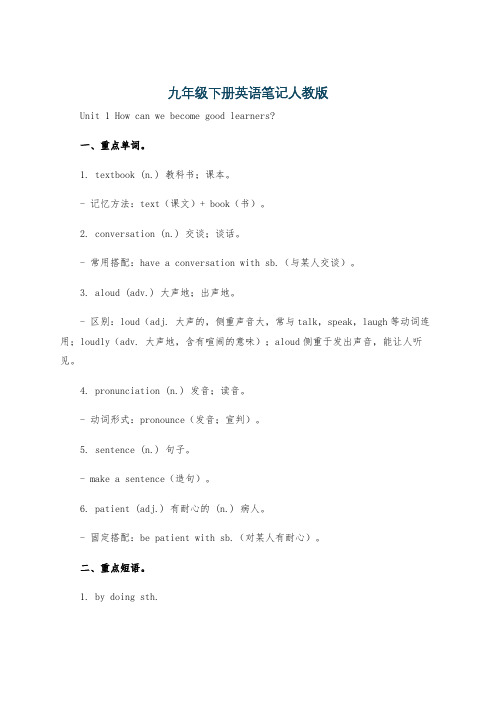
九年级下册英语笔记人教版Unit 1 How can we become good learners?一、重点单词。
1. textbook (n.) 教科书;课本。
- 记忆方法:text(课文)+ book(书)。
2. conversation (n.) 交谈;谈话。
- 常用搭配:have a conversation with sb.(与某人交谈)。
3. aloud (adv.) 大声地;出声地。
- 区别:loud(adj. 大声的,侧重声音大,常与talk,speak,laugh等动词连用;loudly(adv. 大声地,含有喧闹的意味);aloud侧重于发出声音,能让人听见。
4. pronunciation (n.) 发音;读音。
- 动词形式:pronounce(发音;宣判)。
5. sentence (n.) 句子。
- make a sentence(造句)。
6. patient (adj.) 有耐心的 (n.) 病人。
- 固定搭配:be patient with sb.(对某人有耐心)。
二、重点短语。
1. by doing sth.- 意思:通过做某事。
例如:You can improve your English by reading English books.(你可以通过读英语书提高英语水平。
)2. make mistakes.- 意思:犯错。
例如:Everyone makes mistakes when they learn something new.(每个人在学习新东西的时候都会犯错。
)3. look up.- 意思:(在词典、参考书中或通过电脑)查阅;抬头看。
例如:Look up the word in the dictionary if you don't know it.(如果你不认识这个单词就查字典。
)三、重点句型。
1. What about reading aloud to practice pronunciation?- 分析:What about...? 用于提出建议或征求意见,其后接名词、代词或动名词形式。
【精品】人教版英语九年级全册各单元必考知识点(下)

人教版|九年级全册各单元必考知识点(下)Unit7【重点短语】1. be allowed to do sth. 被允许做某事allow sb. to do sth. 允许某人做某事allow doing sth. 允许做某事2. sixteen-year-olds = sixteen-year-old boys and girls 16岁的孩子3. part-time jobs 兼职工作4. a driver’s license 驾照5. on weekends 在周末6. at that age 在那个年龄段7. on school nights 在上学期间的晚上8. stay up 熬夜9. clean up 清扫10. fail(in)a test 考试不及格11. take the test 参加考试12. the other day 前几天13. all my classmates 我所有的同学14. concentrate on 全神贯注于15. be good for 对…...有益16. in groups 成群的,按组17. get noisy 变得吵闹(系表结构)18. learn from 向......学习19. at present 目前,现在20. have an opportunity to do sth. 有做……的机会【重点句型】1. I don’t think twelve-year-olds should be allowed to get their ears pierced.我认为不应该允许12岁的孩子穿耳孔。
2. They talk instead of doing homework. 他们聊天而不是做作业。
3. He is allowed to stay up until 11:00 pm. 允许他们熬到晚上11点。
4. We should be allowed to take time to do things like that more often. 我们应该被允许更加经常的花些时间多做这类事情。
人教版英语九年级下册知识点

Unit9 I like music that I can dance to. .【短语归纳】1.1n that case既然那样,假使那样的话2.stick to坚持;固守3.plenty of大量;充足4.shut off关闭;停止运转5.once in a while偶尔地;间或6.in total总共;合计7.get married 结婚8.by the end of …到...结束9.be known for 因 ... 著名10.expect to do sth. 期望干....expect sb. to do sth 期望某人干....11.catch up with 追上,赶上12.different kinds of music 各种不同的音乐13.quiet and gentle songs 轻柔的歌曲14.take...to…带.... 至U .15.remind…of...使某人想起或意识到.…16.her own songs 她自己的歌曲17.be important to 对 .... 重要18.Yellow River 黄河19.Hong Tao,s latest movie 洪涛最近的电影20.over the years 多年来21.be sure to do sth. 务必干 ... 一定干...22.one of the best known Chinese photographers世界上最有名的中国摄影家之一23.on display 展览,展出e and go 来来往往25.can,t stand 不能忍受二【重点句子】1.I like smooth music that helps me relax after a long week at work. 我喜欢能在我工作了漫长的一周后帮我放松的舒缓音乐。
ughing two hours is a good way to relax. 大笑两个小时是放松的好方法。
人教版九年级英语(全册)重点语法知识点复习梳理

人教版九年级英语(全册)重点语法知识点复习梳理人教版九年级英语重点语法知识点复习梳理一.介词by的用法(Unit-1重点语法)1.意为“在……旁”,“靠近”。
Some are singing and dancing under a big tree. Some are drawing by the lake.有的在大树下唱歌跳舞。
有的在湖边画画儿。
2.意为“不迟于”,“到……时为止”。
Your son will be all right by supper time.你的儿子在晚饭前会好的。
How many English songs had you learned by the end of last term?到上个学期末你们已经学了多少首英语歌曲?3.表示方法、手段,可译作“靠”、“用”、“凭借”、“通过”、“乘坐”等。
The monkey was hanging from the tree by his tail and laughing.猴子用尾巴吊在树上哈哈大笑。
The boy’s father was so thankful that he taug ht Edison how to send messages byrailway telegraph.孩子的父亲是那末的感谢,因而他教爱迪生怎样经由过程铁路电报来转达息。
4.透露表现“逐个”,“逐批”的意思。
One by one they went past the table in the dark.他们一个一个得在黑暗中颠末这张桌子。
5.表示“根据”,“按照”的意思。
What time is it by your watch?你的表几点了?6.和take , hold等动词连用,说明接触身体的某一部分。
I took him by the hand.我拉住了他的手。
7.用于被动句中,表示行为主体,常译作“被”、“由”等。
English is spoken by many people.英语被许多人说。
人教版九年级英语全册各单元知识点总结
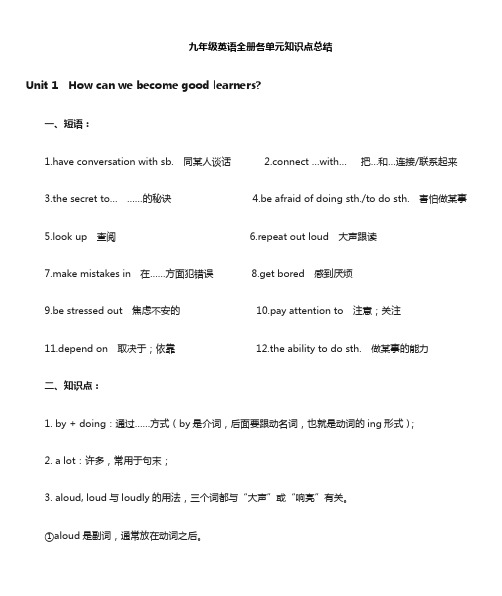
九年级英语全册各单元知识点总结Unit 1 How can we become good learners?一、短语:1.have conversation with sb. 同某人谈话2.connect …with… 把…和…连接/联系起来3.the secret to… ……的秘诀4.be afraid of doing sth./to do sth. 害怕做某事5.look up 查阅6.repeat out loud 大声跟读7.make mistakes in 在……方面犯错误8.get bored 感到厌烦9.be stressed out 焦虑不安的10.pay attention to 注意;关注11.depend on 取决于;依靠12.the ability to do sth. 做某事的能力二、知识点:1. by + doing:通过……方式(by是介词,后面要跟动名词,也就是动词的ing形式);2. a lot:许多,常用于句末;3. aloud, loud与loudly的用法,三个词都与“大声”或“响亮”有关。
①aloud是副词,通常放在动词之后。
②loud可作形容词或副词。
用作副词时,常与speak, talk, laugh等动词连用,多用于比较级,须放在动词之后。
③loudly是副词,与loud同义,有时两者可替换使用,可位于动词之前或之后。
4. not …at all:一点也不,根本不,not经常可以和助动词结合在一起,at all 则放在句尾;5. be / get excited about sth.:对…感到兴奋;6. end up doing sth:终止/结束做某事;end up with sth.:以…结束;7. first of all:首先(这个短语可用在作文中,使得文章有层次);8. make mistakes:犯错make a mistake 犯一个错误;9. laugh at sb.:笑话;取笑(某人)(常见短语)10. take notes:做笔记/记录;11. native speaker 说本国语的人;12. make up:组成、构成;13. deal with:处理、应付;14. perhaps = maybe:也许;15. go by:(时间)过去;16.each other:彼此;17.regard… as … :把…看作为…;18.change… into…:将…变为…;19. with the help of sb. = with one's help 在某人的帮助下(注意介词of和with,容易出题)20. compare … to …:把…比作… compare with 拿…和…作比较;21. instead:代替,用在句末,副词;instead of sth / doing sth:代替,而不是(这个地方考的较多的就是instead of doing sth,也就是说如果of后面跟动词时,要用动名词形式,也就是动词的ing形式)22.Shall we/ I + do sth.? 我们/我…好吗?23. too…to:太…而不能,常用的句型是too+形容词/副词+ to do sth.Unit 2 I think that moon cakes are delicious!一、短语:1. the Lantern Festival 元宵节2. the Dragon Boat Festival 端午节3. the Water Festival 泼水节4. remind sb. of 使某人想起5. eat five meals a day 一天吃五餐6. put on five pounds 体重增加了五磅7. treat sb. with. 用/以……对待某人8. be similar to... 与.......相似9. end up 最终成为/处于10. share sth. with sb. 与……分享……11. as a result结果12. one... the other... (两者中的) 一个…另一个…13. take sb. out for dinner 带某人出去吃饭14. dress up 乔装打扮15. haunted house 鬼屋16. the beginning of new life 新生命的开始二、知识点:1.宾语从句:(三大考点:引导词、时态和语序。
人教版英语九年级全册知识点

人教版英语九年级全册知识点Unit 1★重点单词1.textbook n.教科书;课本2.conversation n.交谈;谈话3.aloud adv.大声地;出声地4.pronunciation n.发音;读音5.sentence n.句子6.patient adj.有耐心的 n.病人7.expression n.表达(方式);表示8.discover v. 发现;发觉9.secret n.秘密;adj.秘密的10.overnight adv.一夜之间;在夜间11.grammar n.语法12.repeat v.重复;重做13.note n.笔记;记录 v.注意;指出14.partner n.朋友;伙伴15.pattern n.模式;方式16.physics n.物理;物理学17.chemistry n.化学18.partner n.搭档;同伴19.pronounce v.发音20.increase v.增加;增长21.speed n.速度 v.加速22.ability n.能力;才能23.brain n.大脑24.active adj.活跃的;积极的25.attention n.注意;关注26.connect v.(使)连接;与…….有联系27.review v.& n.回顾;复习★重点短语1. have conversation with sb. 同某人谈话2. too…to… 太……而不能3. the secret to… ……的秘诀4. be afraid of doing sth./ be afraid to do sth. 害怕做某事5. look up 查阅6. repeat out loud 大声跟读7. make mistakes in 在……方面犯错误8. connect ……with… 把……和……连接/联系起来9. get bored 感到厌烦10. be stressed out 焦虑不安的11. pay attention to 注意;关注12. depend on 取决于;依靠13. the ability to do sth.. 做某事的能力★重点句型1.提建议的句子:①What/how about +doing sth? 做……怎么样?如:What/How about going shopping?②Why don't you+do sth? 你为什么不做……?如:Why don't you go shopping?③Why not+do sth? 为什么不做……?如:Why not go shopping?④Let's+do sth. 让我们做……吧。
九年级下册英语书。

九年级下册英语书。
由于不清楚具体的要求内容(例如是对整本书的知识点总结、重点单词整理,还是课文解析等),以下先提供人教版九年级下册英语书的重点单词和短语部分的整理:一、重点单词。
1. Unit 1.- lantern [ˈlæntən] n. 灯笼。
- stranger [ˈstreɪndʒə(r)] n. 陌生人;外地人;新来者。
- relative [ˈrelətɪv] n. 亲属;亲戚。
- pound [paʊnd] n. 磅(重量单位);英镑(英国货币单位)- folk [fəʊk] adj. 民间的;民俗的。
- goddess [ˈgɒdes] n. 女神。
- steal [stiːl] v. (stole, stolen) 偷;窃取。
- lay [leɪ] v. (laid, laid) 放置;安放;产(卵);下(蛋)- dessert [dɪˈzɜːt] n. (饭后)甜点;甜食。
2. Unit 2.- mooncake [ˈmuːnkeɪk] n. 月饼。
- lantern [ˈlæntən] n. 灯笼。
- stranger [ˈstreɪndʒə(r)] n. 陌生人;外地人;新来者。
- relative [ˈrelətɪv] n. 亲属;亲戚。
- pound [paʊnd] n. 磅(重量单位);英镑(英国货币单位)- folk [fəʊk] adj. 民间的;民俗的。
- goddess [ˈgɒdes] n. 女神。
- steal [stiːl] v. (stole, stolen) 偷;窃取。
- lay [leɪ] v. (laid, laid) 放置;安放;产(卵);下(蛋)- dessert [dɪˈzɜːt] n. (饭后)甜点;甜食。
3. Unit 3.- restroom [ˈrestruːm] n. (美)洗手间;公共厕所。
- stamp [stæmp] n. 邮票;印章。
最新人教版|九年级英语全册各单元必考知识点大全

人教版|九年级全册各单元必考知识点大全Unit1【重点短语】1. have conversation with sb. 同某人谈话2. too…to…太……而不能3. the secret to………的秘诀4. be afraid of doing sth./ be afraid to do sth. 害怕做某事5. look up 查阅6. repeat out loud 大声跟读7. make mistakes in 在……方面犯错误8. connect ……with…把……和……连接/联系起来9. get bored 感到厌烦10. be stressed out 焦虑不安的11. pay attention to 注意;关注12. depend on 取决于;依靠13. the ability to do sth.. 做某事的能力【考点详解】1. by + doing 通过……方式(by是介词,后面要跟动名词,也就是动词的ing 形式)2. talk about 谈论,议论,讨论The students often talk about movie after class. 学生们常常在课后讨论电影。
talk to sb= talk with sb 与某人说话3. 提建议的句子:①What/ how about +doing sth.? 做…怎么样?(about后面要用动词的ing形式,这一点考试考的比较多)如:What/ How about going shopping?②Why don't you + do sth.? 你为什么不做…?如:Why don't you go shopping?③Why not + do sth. ? 为什么不做…?如:Why not go shopping?④Let's + do sth. 让我们做…...吧。
如:Let's go shopping⑤Shall we/I + do sth.? 我们/我...…好吗?如:Shall we/I go shopping?4. a lot 许多,常用于句末。
人教版九年级英语下册Unit 1知识点总结
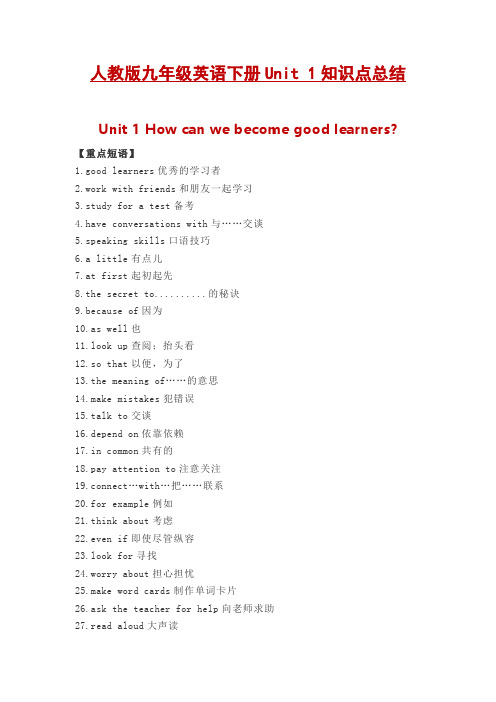
人教版九年级英语下册Unit 1知识点总结Unit 1 How can we become good learners? 【重点短语】1.good learners优秀的学习者2.work with friends和朋友一起学习3.study for a test备考4.have conversations with与……交谈5.speaking skills口语技巧6.a little有点儿7.at first起初起先8.the secret to..........的秘诀9.because of因为10.as well也11.look up查阅;抬头看12.so that以便,为了13.the meaning of……的意思14.make mistakes犯错误15.talk to交谈16.depend on依靠依赖17.in common共有的18.pay attention to注意关注19.connect…with…把……联系20.for example例如21.think about考虑22.even if即使尽管纵容23.look for寻找24.worry about担心担忧25.make word cards制作单词卡片26.ask the teacher for help向老师求助27.read aloud大声读28.spoken English英语口语29.give a report作报告30.word by word一字一字地31.so……that如此……以至于32.fall in love with爱上33.something interesting有趣的事情34.take notes记笔记35.how often多久一次36.a lot of许多37.the ability to do sth.做某事的能力38.learning habits学习习惯39.be interested in对……感兴趣40.get bored感到无聊【重点句型】1.提建议的句子:①What/how about+doing sth.?做…怎么样?如:What/How about going shopping?②Why don't you+do sth.?你为什么不做…?如:Why don't you go shopping?③Why not+do sth.?为什么不做…?如:Why not go shopping?④Let's+do sth.让我们做…吧。
人教版九年级下册英语知识点总结

人教版九年级下册英语知识点总结随着学习的深入,九年级下册的英语内容更为丰富和复杂,涵盖了更广泛的词汇、更复杂的语法结构和更高层次的阅读、写作、听说技能。
以下是对九年级下册英语知识点的全面总结,并通过实例和例文进行详细讲解。
一、词汇的拓展与深化九年级下册的词汇量进一步扩大,不仅包含更多专业术语,还涉及更多抽象概念和情感表达。
例如:专业术语:ecology(生态学),genetics(遗传学),meteorology(气象学)等。
抽象概念:abstract(抽象的),empirical(经验的),theoretical(理论的)等。
情感表达:resentful(愤怒的),grateful(感激的),disappointed(失望的)等。
词汇学习要注重语境和用法。
例如:“abstract”和“empirical”是描述科学研究方法的两个词汇。
“Abstract”指的是基于理论或假设的研究,而“empirical”则是指基于实际观察或实验的研究。
描述情感的词汇可以帮助学生更准确地表达感受,如:“I was deeply grateful for his help.”(我非常感激他的帮助。
)二、语法的进阶与运用九年级下册的语法知识更加深入,涵盖了更复杂的句子结构和更高级的时态和语态。
复杂句子结构:学习如何构建和解析复合句、并列句等复杂句子结构。
复合句示例:I believe that he will succeed.(我相信他会成功。
)其中,“that he will succeed”是一个宾语从句。
并列句示例:She studies hard, and her efforts are paying off.(她学习努力,她的努力得到了回报。
)其中,“She studies hard”和“her efforts are paying off”是两个并列的分句。
高级时态和语态:学习使用现在完成时、过去完成时等高级时态,以及被动语态的更多用法。
人教版初中英语九年级全册各单元知识点、语法归纳整理
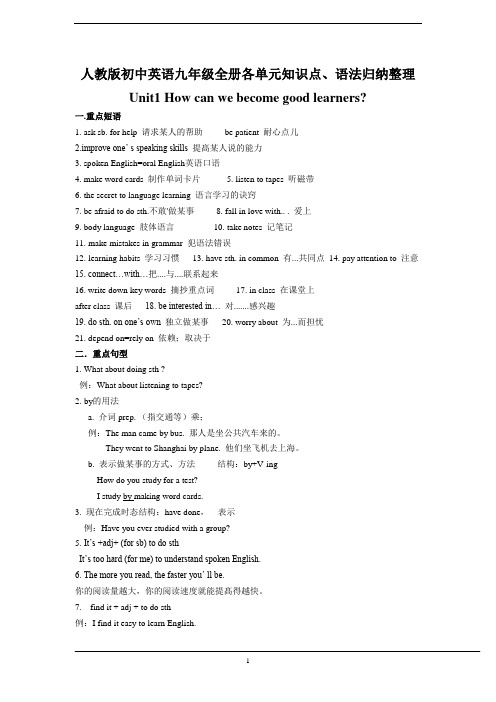
人教版初中英语九年级全册各单元知识点、语法归纳整理Unit1 How can we become good learners?一.重点短语1. ask sb. for help 请求某人的帮助be patient 耐心点儿2.improve one’ s speaking skills 提髙某人说的能力3. spoken English=oral English英语口语4. make word cards 制作单词卡片5. listen to tapes 听磁带6. the secret to language learning 语言学习的诀窍7. be afraid to do sth.不敢'做某事8. fall in love with.. . 爱上9. body language 肢体语言10. take notes 记笔记11.make mistakes in grammar 犯语法错误12.learning habits 学习习惯13. have sth. in common 有...共同点14. pay attention to 注意15. connect…with…把....与....联系起来16. write down key words 摘抄重点词17. in class 在课堂上after class 课后18. be interested in… 对.......感兴趣19. do sth. on one’s own 独立做某事20. worry about 为...而担忧21. depend on=rely on 依赖;取决于二.重点句型1. What about doing sth ?例:What about listening to tapes?2.by的用法a. 介词 prep. (指交通等)乘;例:The man came by bus. 那人是坐公共汽车来的。
人教版九年级英语全册知识点归纳
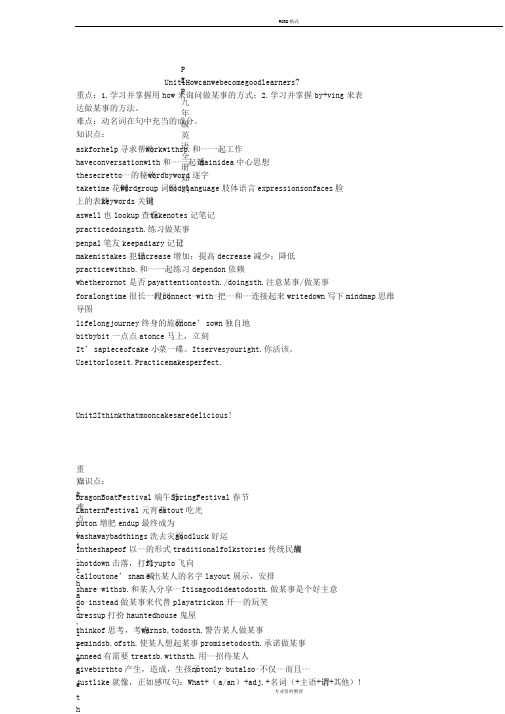
P E P 九年级英语全册知纳 Unit1Howcanwebecomegoodlearners? 重点:1.学习并掌握用how 来询问做某事的方式;2.学习并掌握by+ving 来表 达做某事的方法。
难点:动名词在句中充当的成分。
知识点: askforhelp 寻求帮助w orkwithsb.和⋯⋯一起工作 haveconversationwith 和⋯⋯一起对话mainidea 中心思想thesecretto ⋯⋯的秘诀w ordbyword 逐字 taketime 花时间w ordgroup 词组b odylanguage 肢体语言expressionsonfaces 脸上的表情k eywords 关键词aswell 也lookup 查看t akenotes 记笔记 practicedoingsth.练习做某事 penpal 笔友keepadiary 记日记makemistakes 犯错i ncrease 增加;提高decrease 减少;降低 practicewithsb.和⋯⋯一起练习dependon 依赖whetherornot 是否payattentiontosth./doingsth.注意某事/做某事foralongtime 很长一段时间c onnect ⋯with ⋯把⋯⋯和⋯⋯连接起来writedown 写下mindmap 思维导图lifelongjourney 终身的旅程o none ’sown 独自地 bitbybit 一点点atonce 马上,立刻It ’sapieceofcake 小.菜一碟。
Itservesyouright.你活该。
Useitorloseit.Practicemakesperfect.Unit2Ithinkthatmooncakesaredelicious!重点&难点:1.that,if知识点:DragonBoatFestival 端午节S pringFestival 春节 LanternFestival 元宵节e atout 吃光 puton 增肥endup 最终成为 washawaybadthings 洗去灾祸g oodluck 好运intheshapeof 以⋯⋯的形式traditionalfolkstories 传统民间故事 shotdown 击落,打垮f lyupto 飞向 calloutone ’snam 喊e 出某人的名字layout 展示,安排 share ⋯withsb.和某人分享⋯⋯Itisagoodideatodosth.做某事是个好主意 do ⋯instead 做某事来代替playatrickon 开⋯⋯的玩笑 dressup 打扮hauntedhouse 鬼屋 thinkof 思考,考虑w arnsb,todosth.警告某人做某事 remindsb.ofsth.使某人想起某事promisetodosth.承诺做某事1Unit3Couldyoupleasetellmewheretherestroomare?重点:学习并掌握wh-&how 所引导的宾语从句。
部编人教版九年级英语下册全册知识点复习提纲
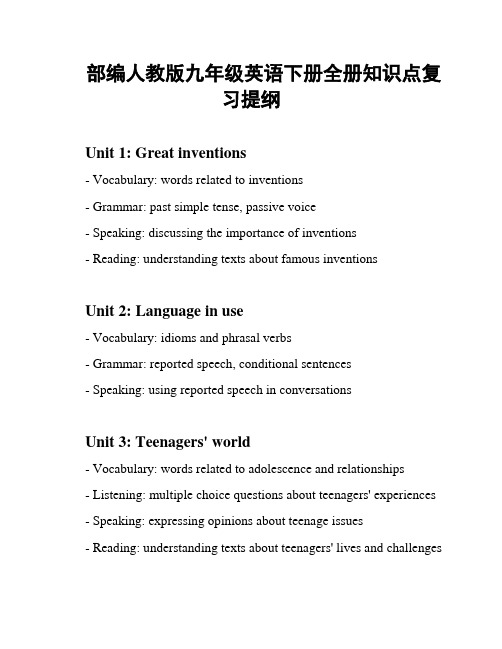
部编人教版九年级英语下册全册知识点复习提纲Unit 1: Great inventions- Vocabulary: words related to inventions- Grammar: past simple tense, passive voice- Speaking: discussing the importance of inventions- Reading: understanding texts about famous inventionsUnit 2: Language in use- Vocabulary: idioms and phrasal verbs- Grammar: reported speech, conditional sentences- Speaking: using reported speech in conversationsUnit 3: Teenagers' world- Vocabulary: words related to adolescence and relationships- Listening: multiple choice questions about teenagers' experiences - Speaking: expressing opinions about teenage issues- Reading: understanding texts about teenagers' lives and challenges- Vocabulary: words related to money and finance- Grammar: present perfect tense, question tags- Listening: true/false exercises about financial situations- Speaking: discussing personal financial experiencesUnit 5: Sports and games- Vocabulary: words related to sports and games- Grammar: past continuous tense, reflexive pronouns- Listening: listening for specific information about sports events - Speaking: describing personal sports activities- Reading: understanding texts about famous athletesUnit 6: My future- Vocabulary: words related to occupations and future plans- Grammar: future tenses, wish clauses- Speaking: discussing career goals and aspirationsUnit 7: Tales of the supernatural- Vocabulary: words related to supernatural events- Grammar: present perfect continuous tense, narrative tenses- Speaking: sharing personal spooky experiences- Reading: understanding texts about supernatural phenomenaUnit 8: Good manners- Vocabulary: words related to social etiquette- Grammar: modal verbs, reported speech questions- Listening: true/false exercises about manners in different cultures - Speaking: discussing polite behavior in various situationsUnit 9: Mistakes and discoveries- Vocabulary: words related to accidents and discoveries- Grammar: passive voice, wish clauses- Listening: multiple choice questions about historical events- Speaking: sharing personal anecdotes of mistakes and discoveries - Reading: understanding texts about scientific breakthroughsUnit 10: The world around us- Vocabulary: words related to the environment and geography- Grammar: present perfect vs. past simple, conditional sentences - Listening: matching exercises about environmental issues- Speaking: discussing environmental problems and solutionsUnit 11: Caring for others- Grammar: relative clauses, past perfect tense- Speaking: sharing stories of helping others- Reading: understanding texts about humanitarian effortsUnit 12: Review and consolidation- Speaking: conversation practice on various topics。
人教版九年级英语下册各单元知识点归纳总结

人教版九年级英语下册全册各单元必考知识点目录Unit7 知识要点梳理 (2)【重点短语】 (2)【重点句型】 (3)【考点详解】 (4)【重点语法】 (6)Unit8 知识要点梳理 (8)【重点短语】 (8)【重点句型】 (8)【考点详解】 (9)【重点语法】 (12)Unit9 知识要点梳理 (12)【重点短语】 (12)【重点句型】 (13)【考点详解】 (14)Unit10 知识要点梳理 (16)【重点短语】 (16)【重点句型】 (16)【考点详解】 (17)Unit11 知识要点梳理 (21)【重点短语】 (21)【重点句型】 (21)【考点详解】 (22)Unit12 知识要点梳理 (25)【重点短语】 (25)【重点句型】 (25)【考点详解】 (26)【重点语法】 (28)Unit13 知识要点梳理 (30)【重点短语】 (30)【重点句型】 (31)【考点详解】 (31)【重点语法】 (33)Unit14 知识要点梳理 (36)【重点短语】 (36)【重点句型】 (37)【考点详解】 (38)Unit7 知识要点梳理【重点短语】1. be allowed to do sth. 被允许做某事allow sb. to do sth. 允许某人做某事allow doing sth. 允许做某事2. sixteen-year-olds = sixteen-year-old boys and girls 16岁的孩子3. part-time jobs 兼职工作4. a driver’s license 驾照5. on weekends 在周末6. at that age 在那个年龄段7. on school nights 在上学期间的晚上8. stay up 熬夜9. clean up 清扫10. fail(in)a test 考试不及格11. take the test 参加考试12. the other day 前几天13. all my classmates 我所有的同学14. concentrate on 全神贯注于15. be good for 对…...有益16. in groups 成群的,按组17. get noisy 变得吵闹(系表结构)18. learn from 向......学习19. at present 目前,现在20. have an opportunity to do sth. 有做……的机会【重点句型】1. I don’t think twelve-year-olds should be allowed to get their ears pierced.我认为不应该允许12岁的孩子穿耳孔。
Unit+2+单元知识点汇总2022-2023学年人教版九年级英语全册
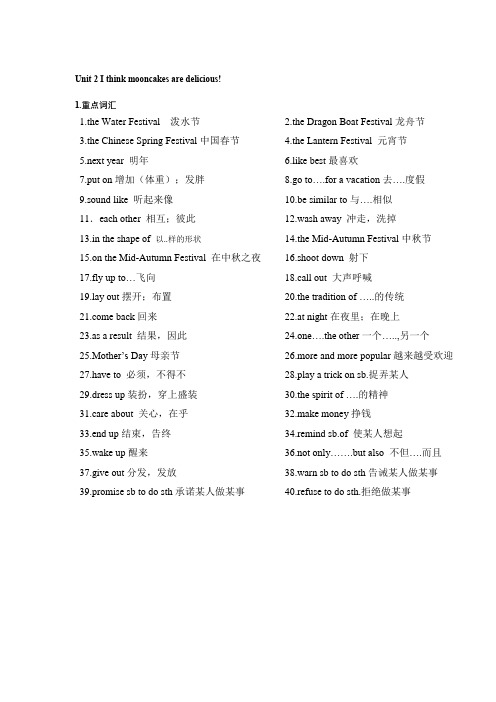
Unit 2 I think mooncakes are delicious!1.重点词汇1.the Water Festival 泼水节2.the Dragon Boat Festival龙舟节3.the Chinese Spring Festival中国春节4.the Lantern Festival 元宵节5.next year 明年6.like best最喜欢7.put on增加(体重);发胖8.go to….for a vacation去….度假9.sound like 听起来像10.be similar to与….相似11.each other 相互;彼此12.wash away 冲走,洗掉13.in the shape of 以..样的形状14.the Mid-Autumn Festival中秋节15.on the Mid-Autumn Festival 在中秋之夜16.shoot down 射下17.fly up to…飞向18.call out 大声呼喊y out摆开;布置20.the tradition of …..的传统e back回来22.at night在夜里;在晚上23.as a result 结果,因此24.one….the other一个…..,另一个25.Mother’s Day母亲节26.more and more popular越来越受欢迎27.have to 必须,不得不28.play a trick on sb.捉弄某人29.dress up装扮,穿上盛装30.the spirit of ….的精神31.care about 关心,在乎32.make money挣钱33.end up结束,告终34.remind sb.of 使某人想起35.wake up醒来36.not only…….but also 不但….而且37.give out分发,发放38.warn sb to do sth告诫某人做某事39.promise sb to do sth承诺某人做某事40.refuse to do sth.拒绝做某事2.宾语从句的连接词1.---- I don’t know ______ you will go home to see your parents.---- Tomorrow afternoon.A. howB. whetherC. whereD. when2. ---- What did you say just now?--- I asked ______ I could open the door.A. ifB. whatC. howD. that3. --- Did Mr White tell you ___________?--- Yes. He said he went there in 2008.A. when he traveled to TibetB. how he goes to TibetC. where he spent his holidayD. why did he visit Tibet4. As teachers, we should let our students do ______ to develop their interests.A. whatever do they likeB. whatever they are kikeC. whatever will they likeD. what they like5. ---Can you tell me _______ at that time?A. what they were doingB. what they are doingC. what are they doingD. what were they doing6. ---- How is the weather tomorrow?---- I don’t know if it ______ tomorrow, if it ______, I won’t go out with you.A. will rain; will rainB. rains; rainsC. rains; will rainD. will rain; rains7. I don’t know when ______. When he ______. I’ll call you.A. will he come; will comeB. he will come; comesC. he comes; will comeD. does he come; comes8. --- Do you know _______ for Shanghai last night?---- At 9:00.A. what time he leavesB. what time does he leaveC. what time he leftD. what time did he leave9. --- Can you tell me ______ get to the park?--- You’d better get there by bus.A. how can IB. how I canC. when can ID. when I can10.--- Alice wanted to know ____ her grandmother liked the bag.A. thatB. ifC. whichD. whatKeys:1-5 DCAAA6-10 DBCBB3.重点词组1.famous “著名的,出名的”同义词well—known,反义词:unknownbe famous for 因…而出名be famous as 作为…而出名China is famous for the Great Wall.Jay Chou is famous as a popular singer in China.2.hate hate sb憎恨某人I enjoy cooking but hate doing the dishes.I like skating , but I hate to skate today.3.diedie 死,不及物,过去式died,现在分词dying.His mother died for five years.His mother has been dead for five years.die of “因…而死’,一般指由于疾病,感情等内因引起的死亡。
人教版初三下册知识点总结

初三下册大纲(初三上下册是同一本书,第一单元-第十单元为上册,第十一单元-第十四单元为下册)Unit11Sad movies make me cry.(一)重点词汇、短语1.Drive v.迫使2.Friendship n.友谊;友情3.King n.国王;君主4.Power n. 权力;力量5.Banker n. 银行家6.Pale adj. 苍白的;灰白的7.Queen n.王后;女王8.Examine v. 检查;检验9.Nor adv. 也不10.Palace n. 王宫宫殿11.Wealth n.财富12.Grey adj.阴沉的;昏暗的;灰色的13.Lemon n. 柠檬14.Uncomfortable adj. 使人不舒服的;令人不舒适的15.Weight n.重量;分量16.Shoulder n.肩膀17.Goal n. 球门;射门;目标18.Coach n.教练;私人教师19.Kick v.踢,踹20.Courage n. 勇敢;勇气21.Pull v. 拖;拉22.Nod n.点头23.Agreement n. (意见,看法)一致;同意24.Disappoint v.使失望25.Would rather 宁愿26.quiet music 轻音乐27.drive sb. Crazy/mad 使人发疯/发狂28.the more…the more… 越……越……; 愈……愈……29.be friends with [sb] 成为【某人的】朋友30.leave out 忽略;不提及;不包括31.have fun with 和某人过得愉快32.call sb. In 召来;叫来33.neither …nor…既不……也不……34.feel like [doing] sth.想要……35.take one’s position 取代……位置36.for no reason 无理;无缘无故37.to start with 起初;开始时38.search for 搜寻39.even though 即使40.feel like 感觉像……41.let …down 使失望42.kick sb. Off 开除某人43.be hard on sb. 对某人苛刻;对某人要求严厉44.rather than 而不是45.pull together 齐心协力;通力合作46.(be) in agreement 同意47.hear sb. Doing sth. 听见某人正在做某事(二)重点句型1.I’d rather go to Blue Ocean because I like to listen to quiet music whileI’m eating.我宁愿去蓝色海洋餐厅,因为我吃饭时喜欢听轻音乐。
九年级下英语知识点人教版

九年级下英语知识点人教版【正文】九年级下英语知识点人教版一、时态1. 一般现在时:表示经常性、习惯性或普遍真理的动作或状态。
例句:I often go to the park on weekends.(我经常在周末去公园。
)2. 现在进行时:表示现在正在进行的动作。
例句:She is studying in the library now.(她正在图书馆学习。
)3. 一般过去时:表示过去某个时间发生的动作或存在的状态。
例句:We watched a movie last night.(昨晚我们看了一部电影。
)4. 过去进行时:表示过去某一时刻或一段时间正在进行的动作。
例句:They were playing soccer when it started raining.(下雨时他们正在踢足球。
)5. 现在完成时:表示过去发生的动作对现在造成的影响或结果。
例句:I have finished my homework.(我已完成作业。
)6. 一般将来时:表示将来要发生的动作或存在的状态。
例句:We will go camping next weekend.(下周末我们将去露营。
)7. 过去将来时:表示过去某个时间本应该发生的动作,但实际未能实现。
例句:He said he would visit his grandparents yesterday, but he didn't.(他说他昨天会去看望他的祖父母,但他没去。
)二、语法1. 名词性从句:用作其他句子成分的从句。
例句:What he said is very interesting.(他说的很有趣。
)2. 定语从句:用来修饰名词或代词的从句。
例句:The girl who is sitting behind me is my best friend.(坐在我后面的那个女孩是我的好朋友。
)3. 状语从句:用来修饰动词、形容词或副词的从句。
- 1、下载文档前请自行甄别文档内容的完整性,平台不提供额外的编辑、内容补充、找答案等附加服务。
- 2、"仅部分预览"的文档,不可在线预览部分如存在完整性等问题,可反馈申请退款(可完整预览的文档不适用该条件!)。
- 3、如文档侵犯您的权益,请联系客服反馈,我们会尽快为您处理(人工客服工作时间:9:00-18:30)。
九年级英语下册全册知识点总结Unit1《How can we become good learners?》【短语归纳】1.have conversation with sb.同某人谈话2.too…to…太……而不能3.the secret to……的秘诀4.be afraid of doing sth./be afraid to do sth.害怕做某事5.look up查阅6.repeat out loud大声跟读7.make mistakes in在……方面犯错误8.connect……with…把……和……连接/联系起来9.get bored感到厌烦10.be stressed out焦虑不安的11.pay attention to注意;关注12.depend on取决于;依靠13.the ability to do sth..做某事的能力14.first of all首先15take notes做笔记,做记录16.enjoy doing sth.16.native speaker说本族语的人17.make up组成、构成18.be angry with sb.对某人生气19.each other彼此20.too many:许多,修饰可数名词too much:许多,修饰不可数名词much too:太,修饰形容词21.change…into…将...变为...22.with the help of sb.==with one's help在某人的帮助下pare…to…:把…与…相比(compare with拿…和…比较)【单元知识点】1.by+doing:通过……方式2.talk about谈论,议论,讨论The students often talk about movie after class.学生们常常在课后讨论电影。
talk to sb=talk with sb与某人说话3.提建议的句子:①What/how about+doing sth.?做…怎么样?What/How about going shopping?②Why don't you+do sth.?你为什么不做…?Why don't you go shopping?③Why not+do sth.?为什么不做…?Why not go shopping?④Let's+do sth.让我们做…吧。
如:Let's go shopping⑤Shall we/I+do sth.?我们/我…好吗?Shall we/I go shopping?4.a lot许多,常用于句末。
如:I eat a lot.我吃了许多。
5.too…to:太…而不能常用的句型:too+形容词/副词+to do sth.I'm too tired to say anything.我太累了,什么都不想说。
6.aloud,loud与loudly的用法,三个词都与“大声”或“响亮”有关。
①aloud是副词,通常放在动词之后。
②loud可作形容词或副词。
用作副词时,常与speak,talk,laugh等动词连用,多用于比较级,须放在动词之后。
如:She told us to speak a little louder.她让我们说大声一点。
③loudly是副词,与loud同义,有时两者可替换使用,可位于动词之前或之后。
如:He does not talk loudly or laugh loudly in public.他不当众大声谈笑。
7.not…at all一点也不,根本不如:I like milk very much,I don't like coffee at all.我非常喜欢牛奶,我一点也不喜欢咖啡。
8.be/get excited about sth.对…感兴奋9.①end up doing sth:终止做某事,结束做某事The party ended up singing.晚会以唱歌而结束。
②end up with sth.以…结束(注意介词with)The party ended up with her singing.晚会以她的歌唱而告终。
11.also也、而且(用于肯定句)常在句子的中间either也(用于否定句)常在句末too也(用于肯定句)常在句末12.make mistakes犯错如:I often make mistakes.我经常犯错。
make a mistake犯一个错误如:I have made a mistake.我已经犯了一个错误。
ugh at sb.笑话;取笑(某人)如:Don't laugh at me!不要取笑我!14enjoy doing sth.喜欢做…乐意做…enjoy oneself过得愉快15one of+(the+形容词最高级)+名词复数形式:…其中之一She is one of the most popular teachers.她是最受欢迎的教师之一。
16It's+形容词+(for sb.)to do sth:(对于某人来说)做某事…It's difficult(for me)to study English.对于我来说学习英语太难了17practice doing练习做某事She often practice speaking English.她经常练习说英语。
18.decide to do sth.决定做某事LiLei has decided to go to BeiJing.李雷已经决定去北京。
19.unless假如不,除非:引导条件状语从句You will fail unless you work hard.假如你不努力你会失败。
20.deal/do with处理如:I dealt with a lot of problem.21.worry about sb./sth.担心某人/某事Mother worried about his son just now.妈妈刚才担心他的儿子。
22.go by(时间)过去.如:Two years went by.两年过去了。
23.see sb/sth doing看见某人正在做某事(如果是看到正在做什么,要用动词ing形式,考的较多的也是动词ing形式)see sb/sth do看见某人在做某事She saw him drawing a picture in the classroom.她看见他正在教室里画画。
24.regard…as…:把…看作为…如:The boys regarded Anna as a fool.这些男孩把安娜看成傻瓜。
25.instead代替用在句末,副词instead of sth/doing sth:代替,而不是I will go instead of you.我将代替你去。
Unit2《I think that moon cakes are delicious!》【短语归纳】1.the Lantern Festival元宵节2.the Dragon Boat Festival端午节3.the Water Festival泼水节4.be fun to watch看着很有意思5.eat five meals a day一天吃五餐6.put on five pounds体重增加了五磅7.in two weeks两星期之后8.be similar to...与.......相似17.end up最终成为;最后处于18.share sth.with sb.与……分享……19.as a result结果20.one,..the other...(两者中的)一个……另一个21.take sb.out for dinner带某人出去吃饭22.dress up乔装打扮23.haunted house鬼屋31.call out大声呼喊32.remind sb.of使某人想起33.sound like听起来像34.treat sb.with.用/以…对待某人35.the beginning of new life新生命的开始36give sb.sth.给某人某物;把某物给某人37.plan to do sth.计划做某事38refuse to do sth.拒绝做某事重点句子1.I think that they’re fun to watch.我认为它们看着很有意思。
2.What do you like about…?What do you like best about the Dragon Boat Festival?关于端午节,你最喜欢什么?3.What a great day!多么美好的一天!4.I wonder if it’s similar to the Water Festival of the Dai people in Yunnan Province.我想知道它是否与云南傣族的泼水节相似。
5.How+adj./adv.+主+谓!How fantastic the dragon boat teams were!龙舟队多棒啊!6.What do/does+sb.+think of sth.?What does Wu Yu think of this festival?吴宇觉得这个节日怎么样?【单元知识点】1.What+a(n)+形容词+可数名词的单数形式(+主语+谓语+其他)!2.How+形容词/副词(+主语+谓语+其他)!……多么……!3.be going to……将要/打算……4.in+时间段在……后5one of+名词复数形式……之一【语法归纳】一、宾语从句宾语从句在复合句中作主句的宾语。
三大考点:引导词、时态和语序。
①由连接词+主语+谓语构成常由下面的一些词引导:②由that引导表示陈述意义that可省略He says(that)he is at home.他说他在家里。
③由if,whether引导表示一般疑问意义(是否、已否、对否等)I don’t know if/whether Wei Hua likes fish.我不知道韦华是否喜欢鱼。
④由连接代词、连接副词(疑问词)引导表示特殊疑问意义Do you know what he wants to buy?你知道他想要买什么吗?⑤从句时态要与主句一致当主句是一般现在时,从句根据情况使用任何时态当主句是一般过去时,从句应使用过去某时态(一般过去时,过去进行时,过去将来时,过去完成时)He said(that)he was at home.他说他在家里。
